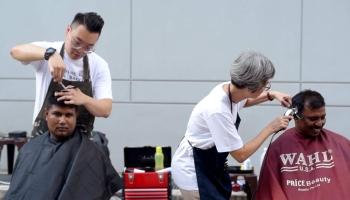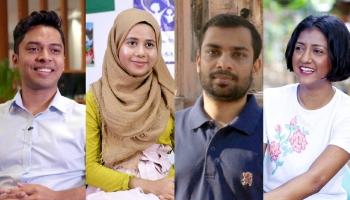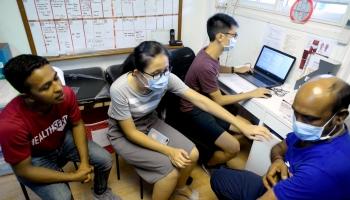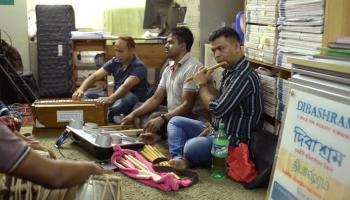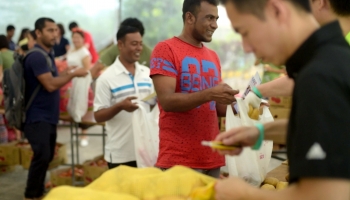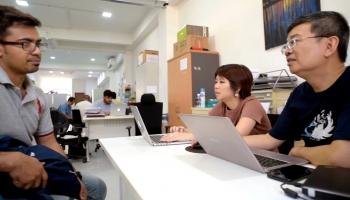Friendships shaped by a pair of scissors
The sun is scorching this Sunday afternoon in Singapore’s east, which makes the gazebos being set up along a backalley of Geylang a much welcomed escape from the heat.
A group of young Singaporeans unfazed by the searing temperatures is busy laying out scissors, electric razors, brushes, mirrors, aprons and chairs. They are here to volunteer with the community initiative Backalley Barbers (BAB), which has been snipping away at social barriers since 2014 by offering free haircuts to the discriminated and impoverished.
Among them is Cai Yinzhou, the young man who heads Backalley Barbers. He was inspired to take barbering matters into his own hands after befriending a group of migrant workers.
“I was playing badminton with a group of workers who lived behind my house. And one of the workers, his father had a health issue. He was working very hard...to try to save money to send back home,” Yinzhou recounts.
“One [way] was also not cutting his hair. I thought, why not learn how to cut my own hair and offer him a free haircut. It was a very small thing that I could do for him. That was how Backalley Barbers started.”
To date, volunteers have styled more than 2,200 heads, picking up their skills from professionals. Many say it has been an enriching and innovative way to meet and get to know migrant workers, who are often described as “a silent, invisible population”. Considering that there are more than 1 million low-wage foreign workers in Singapore, it is ironic that they often remain unseen and unheard.
“Our volunteers they come from various kinds of backgrounds,” says Yinzhou. “The common heart is people who are willing to serve. When you serve, you get your hands dirty and that’s when you really empathise with people on the ground, the struggles they face. With collective people working towards a common goal, we can change communities, that’s a great starting point.”
CONVERSATIONS THAT BOND
Beyond the free haircuts, conversations form the root of BAB’s mission.
Says Yinzhou, “We learn about the sacrifices they’ve made, the challenges they have at work. And some of them with issues, for example, injuries, or salary claim problems, we refer them to the relevant authorities for help. But the baseline is really being friends with them first.”
Ang Min Jia has been volunteering with Backalley Barbers for nearly two years. She says, “Even though they don’t know you so well yet, they will share their personal stories, their dreams. I actually learned a lot from them, compared to how much I can give in terms of a haircut.”
She adds, “A lot of the time we [are unable to] see them as a person, like you and I. We just see them as a worker on the street, who has been building our city in invisible ways.”
And these initial bonds have evolved beyond the first snippets of dialogue. For instance, the volunteer barbers play volleyball with Bangladeshi Friends, a migrant worker group started by Mamun, a regular BAB customer.
“We stay very far from our country. We can have many kinds of problems, sometimes financial problems, [mental health] problems,” says Mamun. “We all try to help each other so we [do] not feel lonely, and not feeling we have nobody here to help.
“Many Singaporeans hang out with us. Every Sunday they come, play with us and support [us with] many things. They really care about us.”
Mamun was one of the first migrant workers Yinzhou met, and he says hanging out with him was like “finding a long-lost brother”. He has even travelled to Bangladesh to visit Mamun’s family.
Yinzhou believes these friendships are invaluable, as they foster cultural understanding, while reshaping negative misperceptions and stereotypes.
“We often see them as beneficiaries, or see them as people who are different from us. So we see ourselves as a bridge for migrant worker issues,” says Yinzhou. “People coming together although we are different, but also realising that they have the potential to help one another.”
COMMUNITY IMPACT TO THE MARGINALISED
Over the past five years, Backalley Barbers has made a considerable impact in the neighbourhood where it all began. So much so that the owner of a salon in Geylang, Vita Hair, offered to have his professional stylists train BAB’s volunteers in advanced haircutting skills.
Away from the alley, BAB visits nursing homes, migrant worker shelters or rental flat communities to give haircuts. People can also go to its office on Wednesdays for a haircut if they need one.
Looking ahead, Yinzhou has big plans for making BAB sustainable, while extending its hand to other marginalised segments of society.
“We dream of reaching out to community partners, who have populations of youth-at-risk under their care. And work with them to have employability and a training model,” he says.
“Imagine if we can hire the youth in this community that we serve to learn how to give haircuts and see a future for them being employed as a barber, and open their own shop in the future.”
This International Migrants Day, we honour the contributions, sacrifices and rights of low-wage migrant workers as they toil behind the scenes. Explore more of their stories here, and find out how you can support the dedicated communities giving back to them.
About Backalley Barbers
Contributors
Director
Producer & Writer
Executive Producer



